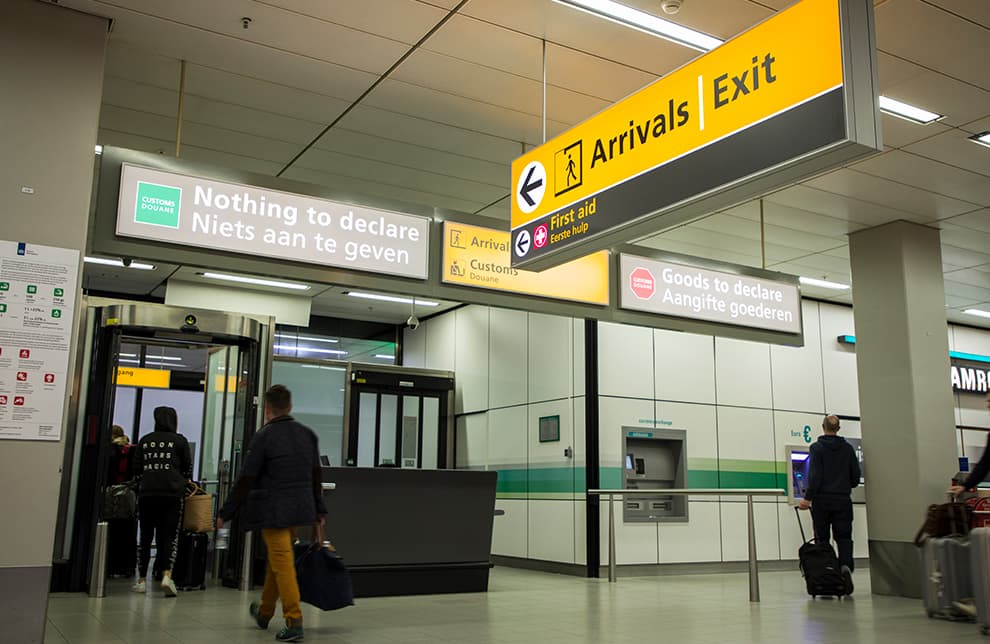One little plant can’t hurt, can it?: Wildlife trafficking
When you think about smuggling at airports, it may be drugs, cigarettes or money that spring to mind. But animals and plants get smuggled too. We call this wildlife trafficking. This is not only a problem for the wildlife being trafficked. It also poses a potential threat to human and animal health, and to the Netherlands’ natural environment.

19 billion euros per year
Each year, criminals all over the world make around 19 billion euros from trafficking protected flora and fauna. Customs at Schiphol come across the most weird and wonderful things. These may include intact rhinoceros horns and live parrots with their beaks taped shut in empty cola bottles, but also medicines containing protected plant and animal species parts.
One little plant can’t hurt, can it?
The fact that you are not allowed to bring these things to the Netherlands will be obvious to most people. However, people are perhaps less familiar with the fact that you are also not allowed to bring many kinds of fruits, vegetables, plants and seeds. Why is that not allowed? That one little plant in your back garden can’t hurt, can it? Or those exotic fruits, so you can evoke a holiday feeling back at home? Unfortunately, these items may carry infestations or diseases. And planting something you have brought from abroad in your garden may pose a danger to plants native to the Netherlands. They could even die out. You are also not allowed to bring medicines that are made from protected plant species, like orchids. That’s why customs strictly controls what leaves and enters the country. Do you want to know what you can and cannot bring to the Netherlands? Then install the Dutch Customs’ Reisapp: voor reizigers application.
Eyes and ears at the airport
It’s only natural that customs staff know exactly what to look out for. But Schiphol believes that it is important that other airport staff are alert to potential trafficking too. After all, they are our eyes and ears at the airport. That’s why we are setting up a special programme for students training to work in aviation – from baggage handlers and support staff, to security officers and flight attendants. Because there are often certain signs that may indicate smuggling. These could be noises or smells coming from someone’s suitcase, a strange object falling out of a person’s jacket pocket or someone who is clearly trying to stay out of sight when opening their suitcase.
Tackling trafficking together
In 2019, Schiphol was one of the first airports in the world to sign the Buckingham Palace Declaration. More than one hundred signatories from across the transport sector became jointly committed to tackling the illegal trade in protected flora and fauna. And Schiphol teamed up with other airports across the world, including on the Galapagos Islands and in Kenya, Sweden and Greece. Smugglers travel through several airports: the point of departure, sometimes a transfer location and then the final destination. Every airport currently has their own methods of collecting data about trafficking. Having a more uniform approach is therefore useful in helping us to identify smuggling routes. For example, if we notice that a particular airport is often used as a starting point, we can encourage the authorities there to check outbound baggage more thoroughly. This may even enable to us to try and rescue protected animal species that are at risk of being trafficked alive.
Read the previous blogs
-
Flying eye-catchers attracting a lot of attention
Published on:We see a large number of aircraft at Schiphol. So we're not that easily impressed, but sometimes special planes come along that do attract a lot of attention.

-
Celebrating 750 years of Amsterdam
Published on:Starting from 27 October 2024, Amsterdam is going to be celebrating its 750th anniversary. We have put together a list of Amsterdam highlights worth visiting.

-
Learn about liquids in your bag!
Published on:At Schiphol we are often asked what the liquids in your hand baggage rule actually entails. Because this sometimes causes confusion.
